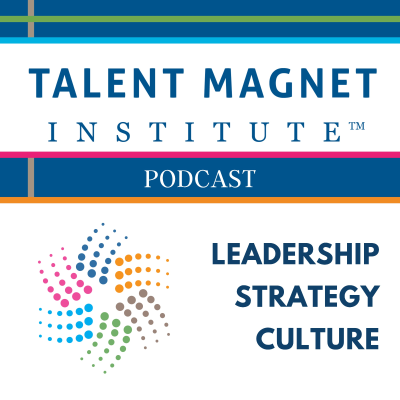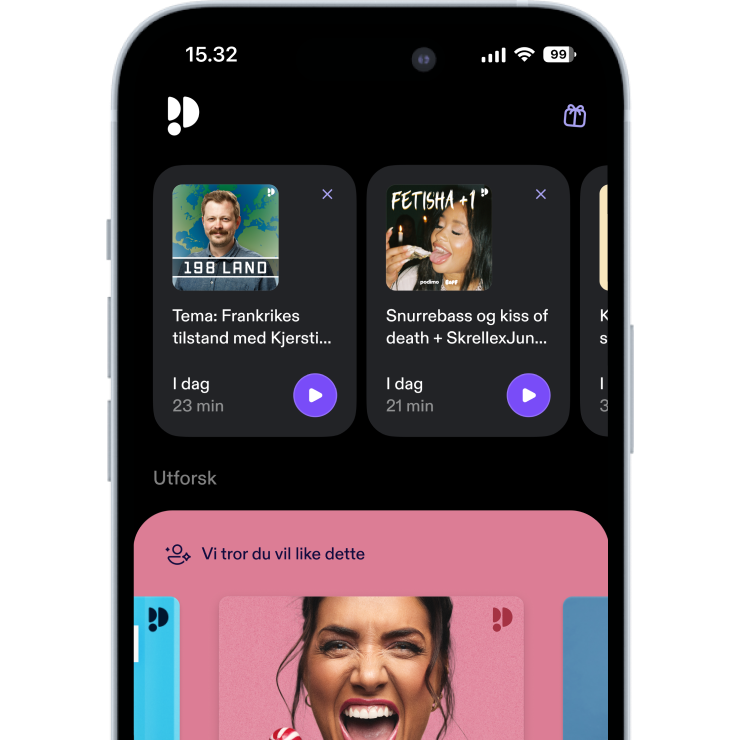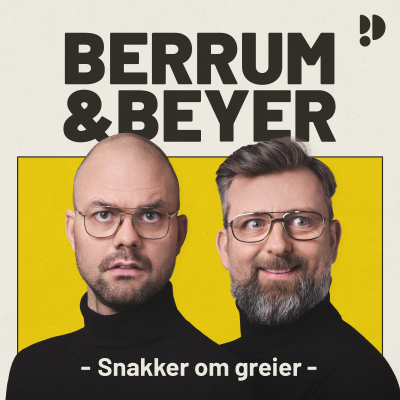
Talent Magnet Institute Podcast
Podkast av Talent Magnet Institute
Tidsbegrenset tilbud
2 Måneder for 1,00 kr
Deretter 99,00 kr / MånedAvslutt når som helst.

Mer enn 1 million lyttere
Du vil elske Podimo, og du er ikke alene
Rated 4.7 in the App Store
Les mer Talent Magnet Institute Podcast
The Talent Magnet Institute is committed to developing leaders to succeed in relationships, work, community, and life: we’ll reframe what success means, and you’ll hear the personal stories of successful leaders from around the globe. From the highest of highs to the lowest of lows, every guest has a unique story to tell and insights to bring. Discover how to achieve a new type of success that goes much deeper than profits: culture, talent, and holistic leadership.
Alle episoder
189 EpisoderOn this episode of the Talent Magnet Leadership Podcast Mike is reflecting on his journey with the podcast, what he has learned, and what's next for the Talent Magnet Institute Team. He also talks about the importance of taking pauses, and the impact the podcast has had on its listeners, clients, and its team. * Growth-minded leaders are willing to pause and assess, and then go after what’s most important. These leaders focus on the things that most align to their values, and lead them closer to where they want to go. In order to do this, leaders also have to learn how to say no. [00:54] * Mike gives a brief recap of all past episodes, and the impact they have had on listeners. The episodes and conversations have helped people connect and let them know that they are not alone in their leadership journey. [2:11] * Saying ‘I quit’ does not have to be negative. Quitting can open doors of opportunity that you would not have had otherwise. [6:27] * Mike talks about the various leadership courses that are available on the Talent Magnet Institute website. [8:23] * The world is changing and that is inevitable and uncontrollable. However, leaders can control how they invest and develop themselves to adapt to these changes and successfully harness the opportunities that come their way. [9:27] * “We're going to put 100% of our focus on our community and direct our time and effort on serving alongside those in our community and those clients and members who rely on us,” Mike begins. “The last couple of years have taught us that we all need support, we need guidance, and we need to be proactive in the trenches,” he adds. [10:32] * In his closing remarks, Mike thanks everyone who has been a part of the podcast from the beginning, and shares where listeners can go to access the free leadership courses. [13:28] Resources Mike Sipple Jr. | LinkedIn [https://www.linkedin.com/in/mikesipplejr] | Twitter [https://twitter.com/mikesipplejr] Talent Magnet Institute [http://talentmagnetinstitute.com/opencourse]
On this episode of the Talent Magnet Institute Podcast Mike explores true leadership in light of the Great Resignation. He also discusses the Great Realization, and how leaders can use these principles to improve their leadership as well as create better environments for their employees. * Mike posits that the Great Resignation is happening because of the Great Realization: people are taking stock of their lives and realizing that where they are is not where they wanted to be. They are changing jobs, and resigning because they're prioritizing their life goals, their families, and their careers. [2:39] * If you influence people, you're a leader, and as a leader, people are watching how you respond to situations and problems. The pandemic has made this very clear, Mike says. The Great Realization has made us think critically about what we want to be doing, and who we want to be doing it with. We don’t want to work with leaders who aren't responsive and proactive. [6:43] * Mike talks about research papers on the Economic Drought from EMSI and The Global Workforce. Research has found that there are fewer people in the workforce now than years ago, and fewer people are looking for traditional full-time jobs. [8:10] * Leaders nowadays - and especially in the future - need to be more compassionate, empathetic, and patient now. They also need to be more focused on their professional development. If you do not develop yourself as a leader, you cannot develop others. You need to recruit employees and build a pipeline, but most importantly, you need to create a culture where people want to work with you, and furthermore, stay with you. [13:55] * Leadership is a privilege and leaders must view it as such. You have the opportunity to help others realize their full potential and become their best selves. Be proactive when it comes to talent development. Create an environment where employees are valued and supported, not one where everything is a competition. Create fair and inclusive environments that invite people to bring their whole selves to work. [16:55] * Mike talks about the course on the Talent Magnet Institute's website that he created, that helps individuals better their leadership skills. [22:10] * At the Talent Magnet Institute, the goal is to build employers who create organizations that encourage their employees to bring their authentic selves. [26:06] * Mike's closing remarks are an encouragement to leaders to become more proactive, never give up, and make use of the tools and resources available out there to become the best leader they can be. [30:09] Resources Mike Sipple Jr. | LinkedIn [https://www.linkedin.com/in/mikesipplejr] | Twitter [https://twitter.com/mikesipplejr] EMSI [https://www.economicmodeling.com/] State of the Global Workplace Report [https://www.gallup.com/workplace/349484/state-of-the-global-workplace.aspx] The Leadership Basics [https://www.talentmagnet.com/opencourse]
Can we create effective leaders with AI? Carolyn Peer and Mike Sipple Jr. share the answer on this episode of the Talent Magnet Leadership Podcast. Carolyn is the CEO and co-founder of Humaxa, and an award-winning human capital management industry luminary. She uses Humaxa - a machine learning-powered employee engagement and performance platform - to connect feedback with actions, through meaningful AI conversations. Carolyn and Mike explore what Humaxa can do for companies and why it is a tool for the future, in this intriguing conversation. * Humaxa functions like a helpful assistant, that helps solve problems within the workforce and empowers employees. The program gathers workforce data via anonymous conversations, and immediately offers solutions to the individual who's talking to Humaxa. It's main function is to reduce the time taken for an employee to receive feedback, to zero. [3:22] * "A lot of the research that we did before building anything, was looking at how willing people would be to communicate with a computer," Carolyn stresses. What she found was that people were more willing to communicate with a computer because of the level of anonymity, and because they didn't feel judged whilst voicing their opinions. She and her company used that concept to empower both the employee and the employer. [5:54] * Humaxa works as an early detection system, and lets leaders know when there are problems that need to be addressed, such as employees feeling like their voices are not being heard. Humaxa fills those gaps by offering strategies based on what the program deems the best solution, and what each individual wants and needs at that particular time. [10:03] * Humaxa anonymously alerts managers when something isn't quite right within the organization. This opens up an opportunity for a conversation on what issues at that time need to be addressed. Even if a conversation doesn't happen, the manager is still aware that something is wrong. "Being able to have those live anonymous conversations with employees based on how they feel is a way to really get into the root cause; not just how they feel but why," Carolyn expresses. [14:19] * Humaxa allows leaders to organize their teams however they desire. The one thing Carolyn cautions leaders against, is having too many matrix teams. "As long as there are at least eight people in a group, the data is anonymized and you can look at the detailed analysis for just that team," she adds. [20:26] * The long feedback process of employee surveys prompted Carolyn to come up with a solution that was more immediate, more meaningful for the workforce, and that would also benefit the company. This is why she created Humaxa. [21:38] * Employees have most of the answers as they are the individuals who deal with the customers the most and converse with each other the most. Leaders need to be able to respond faster, quicker, more efficiently and validate that they are listening. [25:22] * Carolyn's closing remarks are a reminder that Humaxa is not a replacement for manager-to-employee communication, but rather simply a tool to augment those conversations so that managers and employees know what to talk about, and how to get ahead of any problem that may be brewing. [26:54] Resources Mike Sipple Jr. | LinkedIn [https://www.linkedin.com/in/mikesipplejr] Carolyn Peer | LinkedIn [https://www.linkedin.com/in/carolynpeer] | Twitter [https://mobile.twitter.com/carolynpeer] Humaxa [https://www.humaxa.com/]
How do we define happiness? Vanessa King and Mike Sipple Jr. share the answer on this episode of the Talent Magnet Leadership Podcast. Vanessa is a writer, speaker, and leadership and organization development consultant. She is also Director of The Change Space, and a board member of Action for Happiness. Vanessa and Mike explore the true meaning of happiness, how leaders can nurture it at work, and how organizations can build a better and brighter future for upcoming professionals. * Leaders have to think about happiness as not just a word but as an action. Happiness has two parts: joy and euphoria, and accomplishing challenging goals. “Happiness is focused on the things that are within our control, whether individually, collectively or systematically to shift and change,” Vanessa says. [3:26] * COVID has made it easier for organizations to have conversations about happiness. It has also allowed individuals to have more human interactions as people move into a hybrid work environment. [7:30] * When a leader takes the time to ask after an employee’s wellbeing, it builds trust between leaders and the team. This trust lets people feel safe enough to bring their whole selves to work. “It's about these tiny micro human connections,” Vanessa insists. Human beings need to feel good to function well and bringing these tiny interactions in the workplace can ensure that. [10:47] * While working from home is convenient for a lot of people, it has also taken away the boundaries between work and the rest of their lives. It’s not so much about finding a work-life balance because your work is a part of your life, but more so getting a life balance which work is a large part of, Vanessa and Mike agree. [15:30] * Help others become great, but not in the way that you become a pathway to success. Also, ensure that it isn’t going to undermine your own performance or sustainability. [20:12] * “The difference between a good day at work and the worst day at work is a sense of progress,” Vanessa remarks. It’s micro progress that matters: leaders should help their employees feel a small scale of progress that builds up rather than just having one goal. Micro progress is also about cultivating a sense of control and autonomy in people so that they have some choice and freedom about how they do their jobs. [21:20] * Self-compassion is one of the keys to living a happy life. Some other steps are recognizing that no one is perfect, and turning your internal critic into a wise coach. Acknowledge when you make mistakes and do better the next time. [24:12] * When you do helpful things for other people, it makes them feel good, and it also activates the reward centers in your brain which makes you happier. [29:50] * Organizations should be designed to support the growth of their employees and bring the best out of their teams. [31:41] Resources Mike Sipple Jr. | LinkedIn [https://www.linkedin.com/in/mikesipplejr] Vanessa King | LinkedIn [https://uk.linkedin.com/in/vanessa-king-b5629a2] | Twitter [https://twitter.com/changespace] The Change Space [https://www.thechangespace.net/] Action for Happiness [https://www.actionforhappiness.org/] 10 Keys To Happier Living [https://www.actionforhappiness.org/10-keys-to-happier-living]
What truly qualifies an employee? John Baldino and Mike Sipple Jr. share the answer on this episode of the Talent Magnet Leadership Podcast. John is the CEO and founder of Humareso, an HR consulting company. He has spent over 25 years in the field of HR. John and Mike explore hiring, the reasons leaders are having difficulty acquiring and holding onto talent, and what they need to do better to be able to attract talent in a genuine way. * The changes of the past year required business leaders to refocus. John remarks that now more than ever you need to be focused on truth. Be concerned about what's happening in the world and in your employees' lives. Take into account everyone's perspectives, experiences and their own truths, and let that inform the decisions you make as a leader. [1:53] * "If you sit in that sort of spot where you have such a large stand of control and influence, start with small," John advises. Start at your management level, and discuss any decisions you plan to make with them first. Share your reasoning and then listen for responses. It's important to have these discussions before making any decisions because your team will see perspectives and ideas you might not. [9:10] * John cautions against making compensation be the main incentive for holding on to talent. While there is a talent shortage, just because you are paying your employees more, it doesn't mean that they are the right fit for the job. Also, the talent market may not be sustainable in the future. Be wise about compensation and do it in such a way that your employees are not bound to a base compensation for life should there be a market correction. [12:20] * When it comes to the employee life cycle, it's important to think critically about the roles that need to be filled. Analyze the job description that you are putting out and whether the major requirements are truly necessary. Performance management is usually poor within organizations because the HR departments are measuring against what they do not have. This ends up causing employees to leave, and at a fast rate. [14:40] * The problem with modern job descriptions is that leaders are unaware or unsure of the audience they are posting to. The majority of times their qualifications are very exclusive, and that is why they end up struggling in their equity and inclusion objectives. Many roles within organizations are not given based on qualifications but on leaders' comfort, and John challenges that. [17:10] * The amount of years a person has at a particular job or position does not mean they have a defined skill. An assessment of someone's resume can't tell you how their skills will be utilized at work. The interview process is the perfect medium to facilitate this. "I need to be able to ask you behavioral and or situational questions and let you unpack how you would apply certain things," John says. [22:27] * Inclusion is the one of the most important pieces to making sure employees are cared for in their workplaces. Beyond that however, is the concept of what John calls the 'cultural fabric.' "How do we have the thread of this new person weave into the tapestry that has been created to this point," is a stunning analogy that John uses to describe the better way to approach diversity and inclusion within organizations. [27:22] * Companies need to make a conscious effort to train their managers how to be inclusive. They have to be trained on a daily basis on how to communicate with, edify, and uplift their employees. It's not about discipline anymore but about corrective action. [30:20] * When you can give your team the truthful perspective that you're committed to their growth, there won't be enough money that someone can offer them that will make them want to leave. [34:28] Resources Mike Sipple Jr. | LinkedIn [https://www.linkedin.com/in/mikesipplejr] John Baldino | LinkedIn [https://www.linkedin.com/in/johnbaldinohr] | Twitter [https://twitter.com/jbalive] Humareso [https://humareso.com/]

Rated 4.7 in the App Store
Tidsbegrenset tilbud
2 Måneder for 1,00 kr
Deretter 99,00 kr / MånedAvslutt når som helst.
Eksklusive podkaster
Uten reklame
Gratis podkaster
Lydbøker
20 timer i måneden

































